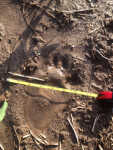Bear sighting near Walker confirmed

Reports of a black bear seen in the area of Walker Corner on Tuesday and then near Walker on Wednesday have been confirmed by Vernon County conservation agent Justin Fogle.
The animal was seen by more than one person on Tuesday and then seen and photographed by Walker resident Isaak Wilkins on Wednesday.
Wilkins said he was driving on Highway C when he saw the bear.
"It was pretty crazy," he said, "you're just not used to seeing that in Missouri."
Wilkins said he had no doubt the animal was a bear. At a distance of 80 to 100 yards, he said, he could see the characteristic lighter brown snout and a couple of blond patches on the bear's back.
Wilkins, his grandmother and his cousin all got to watch the bear for "three or four minutes" before it disappeared into a wheat field.
Wilkins shot some photos of the bear with his cell phone, and even though they are not good quality, it's not too difficult to tell the animal is a bear. The animal was in a field just a couple hundred yards south of town, and Wilkins called Fogle to report the sighting. Fogle met Wilkins at the site sometime later and took photographs of the tracks the bear left in the mud.
According to information from the Missouri Department of Conservation, black bears emerge from their dens very hungry in the spring, and natural foods are scarce. That's also the time when family groups break up and breeding season begins. Wildlife biologist Jeff Berringer said young bears "could move a couple hundred miles," trying to find a place to live.
The bear may have been one two police officers reported seeing a couple of weeks ago in Lamar.
"Most black bears that cause nuisance problems are yearling males that have been driven away by their mother, the information from the conservation department states. "In their search for food, it is most often these young males that come into contact with humans and cause problems."
Since a confirmed sighting has been confirmed in the area, Fogle said there are some points to remember in preventing unintentional bear feedings. Most people do not think twice about feeding their pets outside or even feeding the birds in the back yard, but to a bear it is an endless buffet of food.
Bears are omnivores, meaning they consume both animal protein and vegetation.
About 85 percent of a black bear's diet consists of vegetation. Black bears will look for new shoots of many plant species, like grasses, wetland plants and forbs. Bears will also be opportunistic feeders and seek out readily available food sources like bird seed, cat food, dog food, livestock feed, trash and barbecue grills.
No one ever thinks a bear will go for a grill, but a grill is loaded with grease and leftover cooking residue, Fogle said.
Try to use these precautions and remove the readily available food sources so you do not wake up to your brand new gas grill shredded on the front lawn.
The best way to control the way that bears interact with humans is to make it unpleasant for them. They can live in close proximity to man but that leads to problems. Preventing the animals from becoming comfortable around people produces a much better result than trying to control a bear that has become a nuisance.
Black bears can adapt to changes in their habitat and their food sources. Bears are capable of remembering the location of reliable food sources. Therefore, it is important to take precautions to prevent raids from occurring and to avoid enticing bears with food. Bears are shy by nature, they are wild and unpredictable animals. They may become aggressive if abused or unduly provoked.
Black bears are protected under the Missouri Wildlife Code.
"Black bears that are causing damage may be killed only with the permission of an agent of the department and by methods authorized by him/her, except they may be killed without prior permission if they are attacking or killing livestock or domestic animals, or attacking humans."
Black bears killed under this rule "must be reported immediately to an agent of the department and the intact black bear carcass, including pelt, must be surrendered to the agent within 24 hours."
Fogle said residents should be excited about having a bear in the area, but don't want to turn it into a nuisance animal. The old wildlife manager's axiom "a fed bear is a dead bear is very true." A bear used to being fed will eventually cause problems.
Most often bears are not after livestock, Fogle said" "It's more likely they are after the stock feed. And, they may be just passing through.
Give them some space and let them wander through your property, Fogle said.
"Bears are probably more scared of you than you are of them."
Anyone seeing a bear should report it to local conservation agents Justin Fogle at 417- 667-1089 or Shawn Pennington at 417-684-4588, or on the website at mdc.mo.gov.
